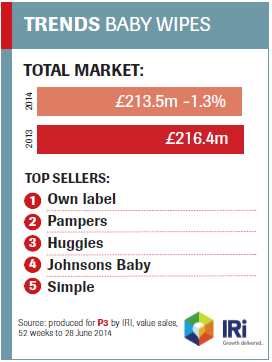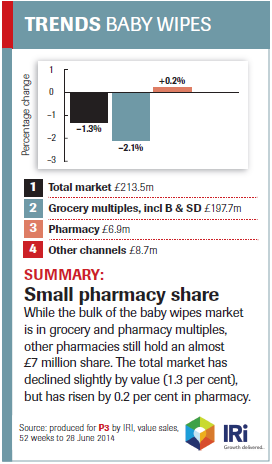Conditions

Keep the focus on child health
In Conditions
Bookmark
Record learning outcomes
 Don’t forget the importance of ongoing training to give the best possible advice to parents visiting the pharmacy about common childhood illnesses
Don’t forget the importance of ongoing training to give the best possible advice to parents visiting the pharmacy about common childhood illnesses
Despite a wealth of information available from online sources, parents will often need advice from a healthcare professional when it comes to children’s health. Pharmacy teams should always be ready to offer fully up-to-date advice on minor childhood ailments and product recommendations. It is more crucial than ever that parents receive reassurance when a self-limiting childhood illness can be managed at home, rather than seeking a GP appointment. What is the latest in the children’s health category?
Personal advice
Craig Craw, marketing director for Nurofen at Reckitt Benckiser, says there is nothing more credible than a recommendation from a pharmacy professional when it comes to product choices. ‘If consumers leave their pharmacy feeling that they are better informed about their health, they will return,’ he says.
‘Pharmacists need to open up that conversation with the consumer and be able to offer that individual, personal service that the big retailers just can’t do. Pharmacy can grow its share by providing the services and products that parents need – by ensuring staff are trained in common childhood ailments and by making the most of space they have.
 ‘A good range of products for various childhood ailments is vital. All need to be clearly signposted in store to make it quick and easy to identify suitable treatments.
‘A good range of products for various childhood ailments is vital. All need to be clearly signposted in store to make it quick and easy to identify suitable treatments.
RB UK research has established that consumers can be confused by packaging and can have problems in choosing the right product for them, ‘so in 2013 they introduced a newly packaged range of Nurofen for Children Cold, Pain & Fever, which provides an easily identifiable product for cold and flu relief for children from three months to nine years.’
Jane Draude, senior brand manager at Thornton & Ross, agrees that pharmacy advice is important to parents.
‘Parents, and new mums in particular, value the input and advice of the pharmacist in relation to their child’s health, particularly with a baby where supermarket self-selection for medicines can be daunting,’ she says.
‘In terms of nappy rash advice, there is an opportunity for pharmacists to recommend a dual purchase – advising on an ointment to treat the rash, followed by an everyday ointment to help prevent it coming back. Metanium recently announced the arrival of the new-look Metanium packs. We’ve listened to mums who say they love Metanium Nappy Rash Ointment and Metanium Everyday Barrier Ointment, but would like to see them looking more like a family and with clear position statements.’
Paul Furlong, managing director of Medela UK, says that while being a new parent can be exciting, it can also be a challenge, with breastfeeding being a popular topic for discussion.
‘Understanding this first stage will mark you apart as a pharmacist and ensure that families come back to you time and time again,’ he says. ‘For example, being able to advise on what makes a good latch, that a lanolin-based cream can soothe sore nipples and where your local breastfeeding group is based would be good to know.
‘Medela has recently done some research into the benefits of expressing with a double breast pump. They learnt that by using a double breast pump, mums can express an average of 18 per cent more milk than with a single pump.’
 Organised fixtures
Organised fixtures
Brand manager for Lyclear, Myriam Mizouni- Bertero, says that, according to Mintel data, head lice is the child health category experiencing the biggest growth, increasing in value by eight per cent. ‘Grouping child products together, such as vitamins and plasters, with head lice treatments, may encourage parents to purchase other essentials at the same time,’ she says.
‘Furthermore, displaying point of sale materials around head lice treatments will enable parents to research the different product options available. We know head lice can be daunting, particularly for first-time parents. More than 70 per cent will turn to pharmacy teams for advice on how best to treat their child, so it’s important that pharmacists and counter assistants are in the best position to respond to customer queries. Our award-winning National Pharmacy Association and Royal Pharmaceutical Society accredited training provides a refresh into the category and will ensure pharmacy positions itself as a valuable source of child health knowledge.’
Tess Clarke, commercial and marketing manager at Milton BabyCare, says that the issues surrounding children’s health change with the seasons. ‘All relevant products could be merchandised together by usage occasion, rather than using the brand blocking method,’ she suggests.
‘That way, parents can see all they will need in one area and makes this easier for them to shop. A pharmacist who can offer a friendly ear to a worried parent will be the pharmacist with repeat customers. As pharmacists will be aware, there is always the threat of tummy bugs. With the help of Milton, it eases parents’ worries that they are doing all they can to keep the baby’s environments as clean as can be.’
Junior products
With certain minor ailments, such as mouth ulcers, adult products are not always suitable for children.
This year RB UK launched bonjela Junior, which is suitable for children from three months. ‘Thirty-three per cent of British children have crooked teeth and need orthodontic treatment to straighten them, so managing mouth pain can be a huge problem area for parents with children aged four to 15 years,’ says Mark Pearson, RB
Pharmacy can grow its share by providing the services and products that parents need – by ensuring that pharmacy staff are trained in common childhood ailments and by making the most of the space they have
category marketing director. ‘The new bonjela Junior launch represents a great solution for consumers and an exciting growth opportunity for retailers.’
Oilatum, a Stiefel range of products from GSK, has extended its £22.2 million brand with the launch of Oilatum Daily Junior Lotion, to meet consumer demand for a moisturising product specifically created for kids. ‘We’ve identified a gap in the market for a moisturising product that consumers can use on their children on a daily basis,’ says Caroline Fredj, senior brand manager for Oilatum. ‘We are confident that the launch of Oilatum Daily Junior Lotion will help drive category penetration and continue to be a firm choice with our target consumer.’
Sharon Morey, nutritionist at Quest Vitamins, recommends ensuring that all customer-facing staff are aware of suitable products they can offer to parents. ‘Choose two or three key themes to focus on, make a feature of them in the store or window,’ she says. ‘Quest Vitamins has recently launched two new products specially designed to meet the nutritional needs of babies and children. Bright Start Vitamin D3 and DHA drops combines two essential nutrients in one convenient formula for babies and children aged one month to five years. InfaBiotix is a probiotic liquid supplement suitable for babies suffering from colic-type symptoms and immune-based atopic conditions such as eczema.’
Child-friendly setting
Sambucol for Kids is a suitable alternative for children since the ban of echinacea for children under 12, says training manager Andrew Petrou. He suggests making the pharmacy more childfriendly. ‘Offer in-store expert advice to parents to educate them on the importance of good nutrition, and the existence of the various health issues that currently face children in the UK,’ he says. ‘Include POS that will allow children to feel comfortable and make shopping easier for parents by allowing room for manoeuvring pushchairs. Have in-store educational tools, such as digital screens or window/store posters, which provide key advice on the current health issues.’
Remind parents to take care with child doses
NHS Choices took up discussion of research that suggests that parents can often misinterpret dosage instructions for liquid medicines. The research, published in the journal Pediatrics this year, was also reported in the Daily Mail, saying that using a spoon to measure medicine for children can lead to potentially dangerous dosing mistakes.
The researchers asked 287 parents of children aged under nine years in the USA, who were prescribed a daily oral liquid medication, which dosing instrument they used – from a range of droppers, dosing spoons or kitchen spoons. Around one in six of parents used a kitchen spoon to measure out liquid medicines, rather than a specific device. About 40 per cent were found to have made an error in dose compared to the child’s prescribed dose. The researchers support a move to a millilitre-only description of dose, delivered using a dropper, oral syringe or dosing spoon, to reduce confusion and decrease medication errors.
NHS Choices pointed out that in the UK manufacturers more commonly supply measurement devices with children’s medicines, so this may be less of a problem here than in the US. www.nhs.uk/news/2014/07July/ Pages/Spoons-lead-to-inaccuratemedicine- doses-for-kids.aspx
Comment
 Bina Patel, Kalsons Chemists, Essex ‘We don’t get that many children coming into the pharmacy, even though there’s an infant school close by, but parents seek advice when their child has an illness or a common school ailment such as measles. I don’t always get a monetary reward for the advice I give, but hopefully if I take care of a child the parent will remember me and will come back again for a different problem. The doctor hasn’t got much time to spend with patients so this is where pharmacy comes into it’s own. Chickenpox has been an issue recently and this is an area where pharmacy staff can shine in terms of offering help and advice. Baby food and milk isn’t an area where we can generate revenue because I cannot compete with the supermarkets on price, but when it comes to knowledge, patients know to come to us.’
Bina Patel, Kalsons Chemists, Essex ‘We don’t get that many children coming into the pharmacy, even though there’s an infant school close by, but parents seek advice when their child has an illness or a common school ailment such as measles. I don’t always get a monetary reward for the advice I give, but hopefully if I take care of a child the parent will remember me and will come back again for a different problem. The doctor hasn’t got much time to spend with patients so this is where pharmacy comes into it’s own. Chickenpox has been an issue recently and this is an area where pharmacy staff can shine in terms of offering help and advice. Baby food and milk isn’t an area where we can generate revenue because I cannot compete with the supermarkets on price, but when it comes to knowledge, patients know to come to us.’
 Pallavi Dawda, Masons Chemists, Coalville ‘The child and infant health category is important to us, because of the high number of young mums who use our pharmacy. Most of the requests we receive are for straightforward paracetamol and ibuprofen products for regular childhood illnesses. However, we try to stock a range of formats and flavours as this helps with repeat business. A lot of the advice we offer is for parents wanting reassurance or asking whether they should bother the GP or not. Some newer products that help with administering medicines to infants, such as baby medicine soothers, have sold really well. We make sure that child and infant health products are merchandised together, along with related products such as thermometers, to help build sales.’
Pallavi Dawda, Masons Chemists, Coalville ‘The child and infant health category is important to us, because of the high number of young mums who use our pharmacy. Most of the requests we receive are for straightforward paracetamol and ibuprofen products for regular childhood illnesses. However, we try to stock a range of formats and flavours as this helps with repeat business. A lot of the advice we offer is for parents wanting reassurance or asking whether they should bother the GP or not. Some newer products that help with administering medicines to infants, such as baby medicine soothers, have sold really well. We make sure that child and infant health products are merchandised together, along with related products such as thermometers, to help build sales.’
 Nemesh Patel, AMG Pharmacy, Braintree ‘Our team is fully engaged with providing a wide range of children and infant medicines. It is imperative that your team is suitably trained to recognise the symptoms and provide informed advice to parents to support them on the whole host of issues that they might encounter, from diarrhoea and tummy aches to pain relief and from verrucae, corns and callous treatments to infant colic. Ensure that this important category is fully stocked at all times and merchandising plans are amended based on school term times, ie head lice sales treatments peak on the return of children to school. As a healthy living pharmacy, our team promotes sugarfree products.’
Nemesh Patel, AMG Pharmacy, Braintree ‘Our team is fully engaged with providing a wide range of children and infant medicines. It is imperative that your team is suitably trained to recognise the symptoms and provide informed advice to parents to support them on the whole host of issues that they might encounter, from diarrhoea and tummy aches to pain relief and from verrucae, corns and callous treatments to infant colic. Ensure that this important category is fully stocked at all times and merchandising plans are amended based on school term times, ie head lice sales treatments peak on the return of children to school. As a healthy living pharmacy, our team promotes sugarfree products.’
